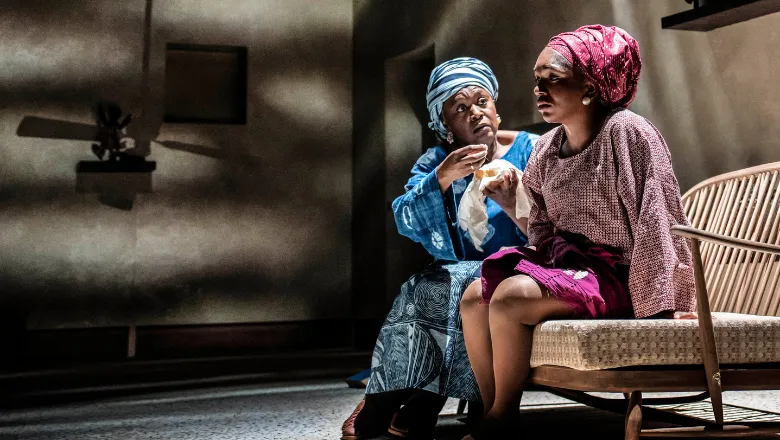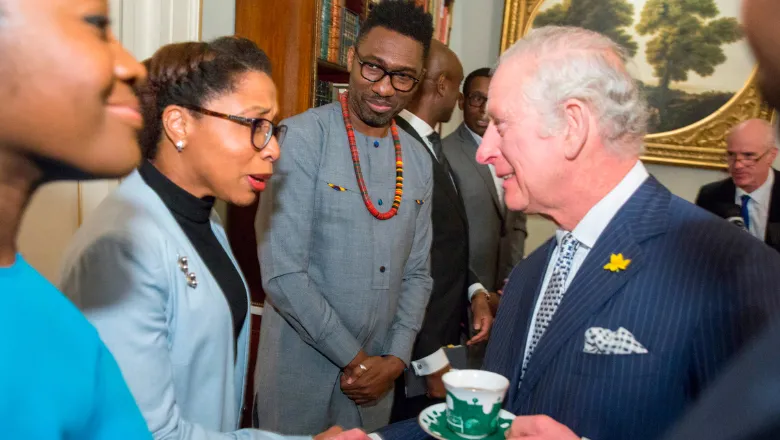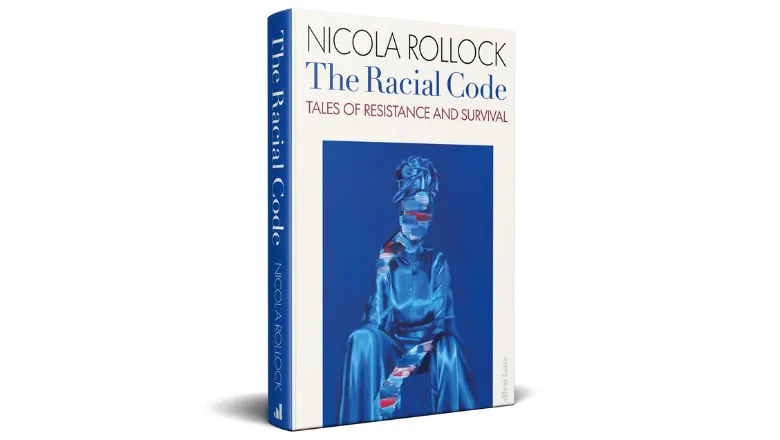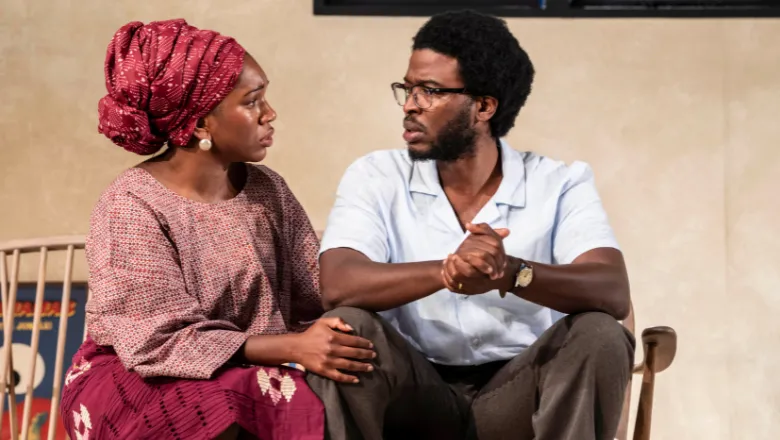04 July 2023
Inside the Young Vic theatre rehearsal room with Professor Nicola Rollock
Ahead of the UK premiere of the play 'Beneatha’s Place', Professor Nicola Rollock discusses her work as Cultural Consultant on the show

'Beneatha's Place' is a razor-sharp satire at the Young Vic theatre, written and directed by Kwame Kwei-Armah.
Inspired by the groundbreaking modern classic 'A Raisin in the Sun' by Lorraine Hansberry, this UK premiere challenges today’s culture wars about colonial history and reckoning with the past.
Nicola Rollock, Professor of Social Policy and Race at King's, has worked as Cultural Consultant for the show. In this Q&A, she discusses being in the rehearsal room, the experience of Black female academics and the importance of having freedom to explore and create in academia.

Can you tell us about your role in the rehearsal room and your work with Director & Writer of 'Beneatha’s Place' Kwame Kwei-Armah?
Being in the rehearsal room has helped me appreciate how much hard work, skill and collaboration goes into pulling a production together before it reaches the stage and what we eventually see as members of the audience. 'Beneatha’s Place' draws on Lorraine Hansberry’s character Beneatha from ‘A Raisin in the Sun’, develops her character and imagines her future.
The play covers themes around politics, race, power, history and education. My role, particularly during read through and floor work, was to help explain key concepts around race and racism, theory and identity and also academia in order to help the actors connect with and inhabit their characters’ biography. Without giving too much of the plot away, my presence and contributions as a Black female professor were also important especially, though not exclusively, to the lead character Beneatha played by the actor Cherelle Skeete.
How has your research informed your work on the play?
I shared findings from my research on the career experiences and strategies of Black female professors and discussed the various ways in which racism manifests drawing on my book ‘The Racial Code: tales of resistance and survival’ which was published by Penguin Press at the end of last year. Certain chapters were especially helpful to Beneatha. In addition, I shared details about particular academics whose profile and subject specialism would be helpful to the actors as they worked to embody their characters. We also had great conversations about how we act and think in higher education – how the business of higher education gets done. I also spent a lot of time with Cherelle discussing my research and my experiences of how it feels to be a Black female academic - what this might look like in the body; the delicate tension between one’s professional standing and how others position you; about coping and navigating these various states.

Any highlights from your time working with the company? What have you found particularly interesting?
I have thoroughly enjoyed working with the company on this production. I have been able to tap into the more sensing, creative, expressive side of my character that tends to get suppressed in the world of academia. While Kwame and I knew each other prior to my involvement in the production, I had never seen him operate in a professional capacity. As well as being Artistic Director of the Young Vic, he is both Writer and Director of 'Beneatha’s Place', so I’ve been able to bear witness to the breadth of his skill in holding the actors and team together – taking them on a creative journey, helping them navigate some of the issues around race and racism as detailed in the script, and develop a production. It takes exceptional acuity to be able to do that and, to do so while remaining grounded and generous in spirit, is a gift indeed.
I’ve also had a glimpse into the dedication, skill and hard work involved in being an actor. I’ve witnessed the ways in which the actors come into or breathe life into a character – intonations of the voice, specific traits, the way they occupy space. I’ve obviously seen the play and particular scenes several times and yet remain moved by it on each occasion which is a powerful testament to each of the actors. And then there is the body of people who make up the Creative Team who, while they are invisible to the audience, provide the structural backbone to the play. Witnessing how the actors and Creative Team work together toward a single vision has been exciting and inspiring.
What’s the play about and what do you think audiences will take from the production?
The play is necessarily provocative and uncomfortable in places and is also funny. Of course, the audience will take different things from the play but I suspect it will open up reflection, if not conversation, about race, identity, colonialism and power and the continued relevance of these issues today. For me, it is wonderful to see a Black British woman centre stage and to see her convey so powerfully the strategising, the courage, the challenges and pain that are often central to our existence yet which all too often remain invisible or ignored.

In your experience, why can an academic perspective or a consultant role be important in the development of art?
The very structure of higher education means that it is easy to become focused on particular forms of knowledge production and to do so in relation to fixed or siloed subject specialisms. I have always found that rather limiting and have enjoyed working across sectors and thinking creatively about how to influence debate, share ideas, facilitate engagement and impact. That has always been my starting point whether it has been working as Specialist Advisor to the Home Affairs Select Committee ‘The Macpherson Report: Twenty-Two Years On’ inquiry, as academic expert on the Channel 4 documentary ‘The School that Tried to End Racism’ or, in this case, as Cultural Consultant to the Young Vic’s production of Beneatha’s Place.
In 2020, I curated an exhibition called ‘Phenomenal Women’ which went on display at London’s Southbank Centre and featured portraits of Black female professors taken by Bill Knight. I was struck by how many people told me they visited the exhibition and how inspiring, moving and informative they found it. Art and other creative forms of expression, such as the storytelling format I make use of in The Racial Code, can connect with a wider audience on an emotive level and give life to and facilitate a compelling link back to research debates and concerns.
Anything else you want to add that would be of interest to the King’s community?
It’s really a comment to the sector. In recent years, we’ve seen major programmes and funding streams announced relating to the experiences of Black and minority ethnic groups in higher education. I would like to see universities and funding bodies take racial justice more seriously by including those of us with specialism in the area in the actual design of those programmes and in setting their objectives. That inclusion must be more than tokenistic and reflect a genuine commitment to working collaboratively.
In addition, I would like to see greater flexibility in how funding applications are structured and more space for short, two-page proposals seeking to explore innovative collaborations and new ideas. There should be space to be led and inspired by where an area of research inquiry might lead and the impact it might have as opposed to having to commit to formally recognised, prescribed forms of output a priori. It is this freedom to explore and create - to be genuinely entrepreneurial - that, in my view, can lead to greater possibilities for impact and engagement.
BENEATHA'S PLACE
Playing at the Young Vic until 5 August 2023.
For morning information and tickets, visit the Young Vic website.

